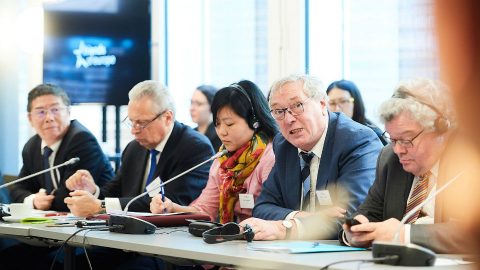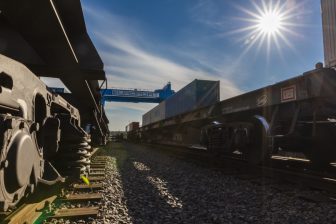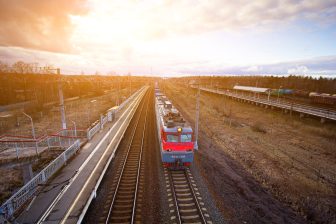
New Silk Road: thinking outside the state
The West misunderstands the significance of the Belt and Road Initiative. That is the view of award-winning professor Richard Griffiths of Leiden University in the Netherlands, also fellow of the International Institute for Asian Studies. He has examined the collateral benefits presented by the New Silk Road, extending far beyond the end-to-end trading opportunities with China. Professor Griffiths, who will deliver a presentation at the European Silk Road Summit, outlines his perceptions, and says that trade by rail is at the heart of a new era of commercial exchange and cultural understanding.
China seems adept at handling relations on may different levels and in many different directions, all at the same time. To many, that may be considered the definition of a successful trading position. Yet, while there is a danger of conflating China’s domestic issues and vast domestic development programme with the bad press of conflicting geopolitical aims and international relations, there is a quiet success story that is reaching out across continents and bringing trade and the promise of prosperity to nations around the world. It is a story that has China in the middle. That is the story of the New Silk Road, and a network that has rail as its arteries.
Holding back the full potential
Professor Richard Griffiths proposes to look deeper into the motives behind the China’s Belt and Road Initiative, and intends to give the summit a head start on better, more profitable trading relations. “My approach is to say what is the problem that China’s policy is trying to solve? Why would China want to build a network of trade routes that traverse foreign territories, many of them landlocked countries with a historically low trade threshold?” Given that railways have always been built to move freight on from ports of entry to new markets, there is nothing new here. However, China is implementing this age-old plan on a twenty-first century global scale.
It is this scale of foreign direct investment which Professor Griffiths argues is a source of concern in the West and is holding back the full potential of the New Silk Road. “The message is that it does not necessarily matter who is building trade infrastructure”, he says.“A train is a train. Loaded is loaded. It travels so get on it.”
All about finance
Ignore the back-packing bloggers amusing themselves with the cultural differences most keenly observed from a carriage window, the reality of cross-continental railways has always been freight based. Moving goods around the world has always been the reason for the railways, and it is only the modern political and ideological context that has drawn attention to the Chinese led Belt and Road Initiative. Professor Griffiths says it is much more about goods crossing borders.
“If you promote the building of infrastructure in a foreign state, it is ultimately that state that decides what happens to it, and how it is deployed”, says Professor Griffiths. He says that unlike the historical European colonial ambitions, the modern day Chinese plans take more cognisance of the world today. In other words, it is all about finance.
“That finance comes with a debt attached and that debt is payable in due course to Chinese interests. That is something the West watches very closely and about which it is perhaps uneasy. Once the infrastructure is there, and this is what we will be discussing at the summit in Venlo, the key is to explore what opportunities are available, and how can we make them work in equitable trade terms.”
Not a Chinese operation
What promises to be a fascinating session will also be accessible to the entire summit audience. Professor Griffiths is applauded as a world-class communicator and was recently recognised with the Outstanding Educator Award at the academically acclaimed World Forum in The Hague. He was cited for his ability to have his audience get the best out of themselves. If delegates harbour any doubts about how they may relate their business opportunities to the Silk Road in the twenty-first century, this is the session that will set them on their way to better understanding and better trade.
Civilisations all along the historical Silk Road trade routes have found benefit from communications and better connections. Today, there are opportunities presented that benefit interests beyond China. Professor Griffiths concludes that there is definite collateral gain from embracing these new trade routes. “China does not think of this as a Chinese operation.” It is a subject on which he has already published two volumes. Bringing the best of that learning to the summit is his intention. Delegates in November can examine all the possible relationships in one place, all at once. That, after all, is the essence of a good Silk Road trading position.
European Silk Road Summit
Do you want to hear more of Richard Griffiths? The European Silk Road Summit takes place on 26 and 27 November in Venlo, the Netherlands. Registration for this event is now open. The programme can be found here.




